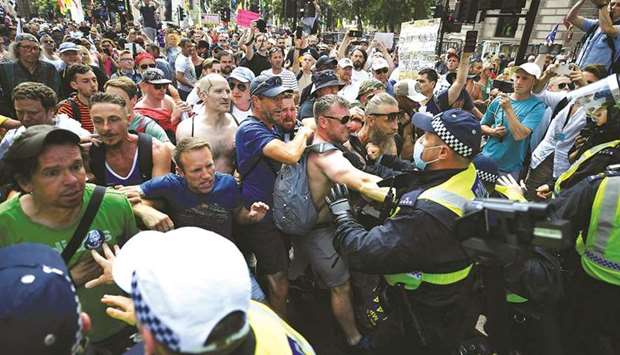Day-to-day pandemic restrictions were lifted in England on Monday but “freedom day” was met with deep concern from scientists as coronavirus cases surge across the nation — and around the world.
Fuelled by the more infectious Delta variant, cases are spiking across the Asia-Pacific, parts of Africa and Europe, and even the heavily vaccinated US.
Daily infection numbers have climbed in Britain, averaging more than 50,000 since last week.
But despite accusations against the UK government of recklessness, it lifted legal mandates on social distancing, wearing masks and working from home, urging personal responsibility instead.
Nightclubs in England reopened their floors to dancing at the stroke of midnight for the first time since March 2020, while sports stadia, cinemas and theatres can now run at full capacity.
“I thought, well, we missed New Year’s, so why not come out and celebrate?” said Nicola Webster Calliste, 29, outside a club in Leeds, northern England. “It’s like a new chapter.”
Alex Clarke, 40, was at the front of the queue outside a club in north London.
“There’s a bit of apprehension and uncertainty about the protocols,” Clarke said. “But as long as everyone is sensible, then it’ll be alright.”
Covid-19 travel rules and self-isolation for close contacts remain in place.
Prime Minister Boris Johnson — who is self-isolating after his health minister was infected — has defended the move, dubbed “freedom day” by some media, but urged people to remain prudent.
The government says thanks to a rapid vaccination programme, the risks to the healthcare system are manageable.
Vaccines Minister Nadhim Zahawi told Sky News he was “confident” the government was “doing the right thing” now, before any winter resurgence in respiratory disease.
But the approach is marked by “moral emptiness and epidemiological stupidity”, said University of Bristol public health expert Gabriel Scally.
Scotland and Wales, whose devolved governments set their own health policy, said they would maintain the mask mandate among other curbs.
Meanwhile, England’s car plants, railways, supermarkets and restaurants yesterday warned the government that a Covid-19 tracing app, which has told hundreds of thousands of workers to isolate, was wrecking the recovery and pushing supply chains to the brink of collapse.
Alerts, or “pings”, sent out by the official app telling anyone identified as a contact of someone with the disease to self-isolate for 10 days have caused huge disruption in schools, businesses and the healthcare system.
Under pressure, the government said later yesterday it would allow workers in critical roles, such as air traffic controllers and train signallers, to carry on working despite being “pinged” if they were fully vaccinated.
Prime Minister Boris Johnson, Finance Minister Rishi Sunak and Health Minister Sajid Javid are all isolating after Javid tested positive.
Some restaurants have shut, supply chains are teetering and the car breakdown service AA warned of longer response times at call centres.
Carmaker Stellantis said its Vauxhall van factory in Luton would move from three shifts to two shifts for the duration of this week, and Nissan adjusted production in some areas of its Sunderland plant to counter lower staffing numbers.
“The pingdemic is here and businesses need urgent change,” Richard Walker, the managing director of supermarket chain Iceland, said on Twitter.
Britain’s biggest rail operator, Govia Thameslink, said it may need to cancel some services in London and South East England.
Retailer Marks & Spencer said it may have to reduce business hours. “Where the industry will see the pain is in the supply chain, because logistics runs tight anyway to be efficient,” Marks & Spencer CEO Steve Rowe said in a statement.
British baker Warburtons said it was struggling to maintain local deliveries as more staff self-isolate, exacerbating a national driver shortage.
The crisis has overshadowed Johnson’s “freedom day” on Monday, which ended more than a year of lockdown restrictions in England. A person familiar with the situation in the retail sector said just under 10% of staff were absent, although some retailers were seeing absence rates of around 30%.

Protesters scuffle with police during u201cFreedom dayu201d demonstration, as most coronavirus restrictions were lifted in London, Britain, on Monday.
